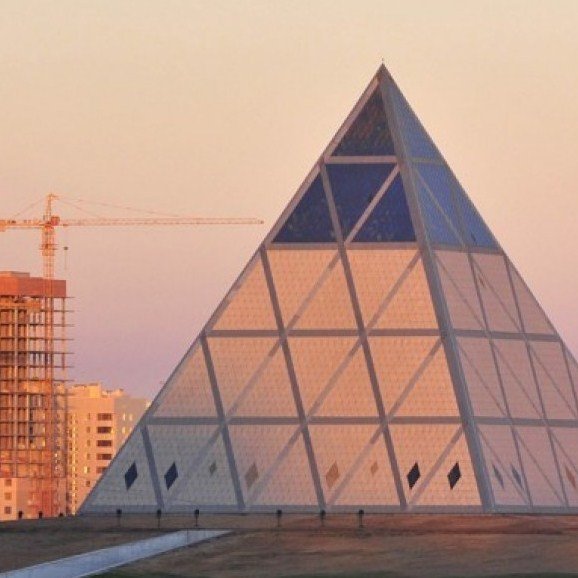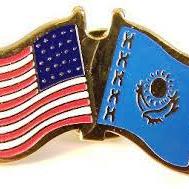(Monkey Cage/WP) On June 10 and 11, Kazakhstan hosted the Fifth Congress of World Religions. Doing so was an important moment for the country, allowing it to attract international attention and display its newly acquired soft power, as highlighted by the presence of United Nations Secretary-General Ban Ki-moon.
This “Congress of World Religions” was launched in 2003 by President Nursultan Nazarbayev, in power since the collapse of the Soviet Union. Since then it has been housed in one of main buildings of the new capital city Astana: the Palace of Peace, built by the British architect Norman Foster. Over the years, the Congress has grown in importance and visibility, hosting almost 80 delegates representing about 30 countries. The Congress promotes a narrative on peace and culture of tolerance as a solution to violence exercised in the name of religion.
The Congress is just one of the elements in Kazakhstan’s soft power toolkit, each of which performs both a domestic and an international function. For instance, the concept of “Eurasia,” which officially describes Kazakhstan as being at the crossroads of Europe and Asia, West and East, promotes both the country’s multivectoral policy of international relations, in which Kazakhstan balances its relations with Russia, China, the West and the Islamic world, and also its domestic policy of “interethnic concord” between the ethnic Kazakh majority and the still important Russian and Slavic minorities.
A similar dual strategy is at work with the Congress. Its complete title is “Congress of Leaders of World and Traditional Religions,” which highlights a domestic agenda. As in the other post-Soviet countries, the Kazakhstani authorities consider that some religions are “traditional” (meaning they have been present in Kazakhstan since decades or centuries) and some others are “non-traditional” (mostly new groups, often considered “sects”). In the non-traditional category, Kazakhstani authorities include both proselytizing Protestant movements (the Lutheran Church is usually the only Protestant denomination represented at the Congress, because it is a non-proselytizing Church focused on the religious needs of the German minority), and Islamic movements that do not recognize the religious authority of the muftiyat, the Spiritual Board that oversees all Islamic activities in the country. The religious diversity showcased during the Congress is therefore incomplete, excluding movements that break Kazakhstan’s religious and political status quo: Baptists, Jehovah’s Witnesses, Hare Krishna, Ahmadi Muslims, Sufi groups, and so on.
Despite the grandly inclusive title of the Congress, Kazakhstan in fact restricts minority religious expression. New legislation on religion passed by the government’s Religious Affairs Agency in 2011 reduced drastically the number of recognized religions from 46 to 17, in the name of fighting against religious extremism. But the Congress also performs a foreign policy mission: It promotes the idea that Kazakhstan, like the international community to which it seeks to belong, supports mutual understanding and respect between religious communities. Kazakhstan’s initiative has thus been welcomed and supported by several international organizations such as the United Nations, UNESCO, the Organization for Security and Cooperation in Europe (OSCE), as well as the World Islamic League, and the Organization of Islamic Cooperation (OIC).
Kazakhstan has been promoting this concept of a “dialogue of civilizations” for decades. In the early 1990s the end of Soviet-style Marxism contributed to the rise of civilizational narratives, embodied by Huntington’s well-known Clash of Civilizations. The concept of a “dialogue of civilizations” is a response to the notion of “clash”: many international, interregional and interreligious initiatives promoting a culture of dialogue took shape around that concept. The Kazakhstani authorities participate in this globalized trend by presenting the country at the crossroads of several “civilizations.” They promoted Kazakhstan’s “path to Europe” in 2009-2010 through its chairmanship of the OSCE; its status as the first to have an “Individual Partnership Action Plan”with NATO; its full and active support of China’s New Silk Road Belt initiative; and its role as Eurasia’s new regional pole for Islamic finance, in order to dialogue with the Middle East and the main Islamic international organizations.
The “dialogue of civilizations” performs another function: choosing a side in the West’s “war on terror,” and denouncing the rise of extremism in the world. Kazakhstan positions itself in full harmony with, for instance, the recent “Summit on Countering Violent Extremism” held in Washington in February. That summit called on more than 60 nations to join the fight against violent extremism, targeting in particular the dramatic situation in Syria and Iraq. Kazakhstan endorses the U.S. narrative that calls for adopting a long-term strategy of developing economies and creating jobs in regions that offer fertile grounds for violent extremists to recruit. That includes Kazakhstan; a few hundred Kazakhs fight with the Islamic State. Astana positions its so-called “dialogue of civilizations” and “dialogue of religions” as useful devices in this effort.
Is this “dialogue of civilizations” effective in fighting the socioeconomic and cultural roots of various Islamist insurgencies? As Marc Lynch has shown inhis book on the Arab Spring, insurgencies are often fueled more by socioeconomic inequality, resentment and humiliation than by a misinterpretation of Islam that could be corrected by world religious leaders. Further, by marginalizing nonbelievers and adherents of banned religions, Kazakhstan might arguably be undermining its own effort at interreligious dialogue.
Kazakhstan is certainly contributing to the world’s broader trend of cultivating discussion among many different religious and cultural identities. The “dialogue of civilizations” may be a way to avoid addressing rising world inequalities and geopolitical misbalances, but if so, that’s a failure not of Kazakhstan but of the international community as a whole. Kazakhstan has been able to wield this soft power tool in branding itself as a responsible actor on the international scene, playing according to the main rules of the game, whatever those may be.
See the original post at The Monkey Cage.










